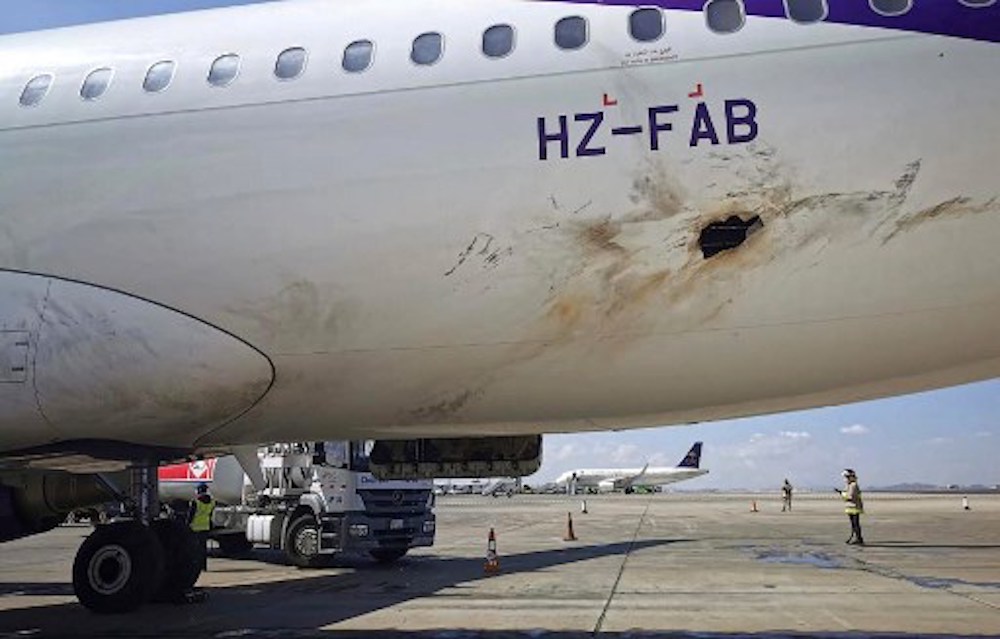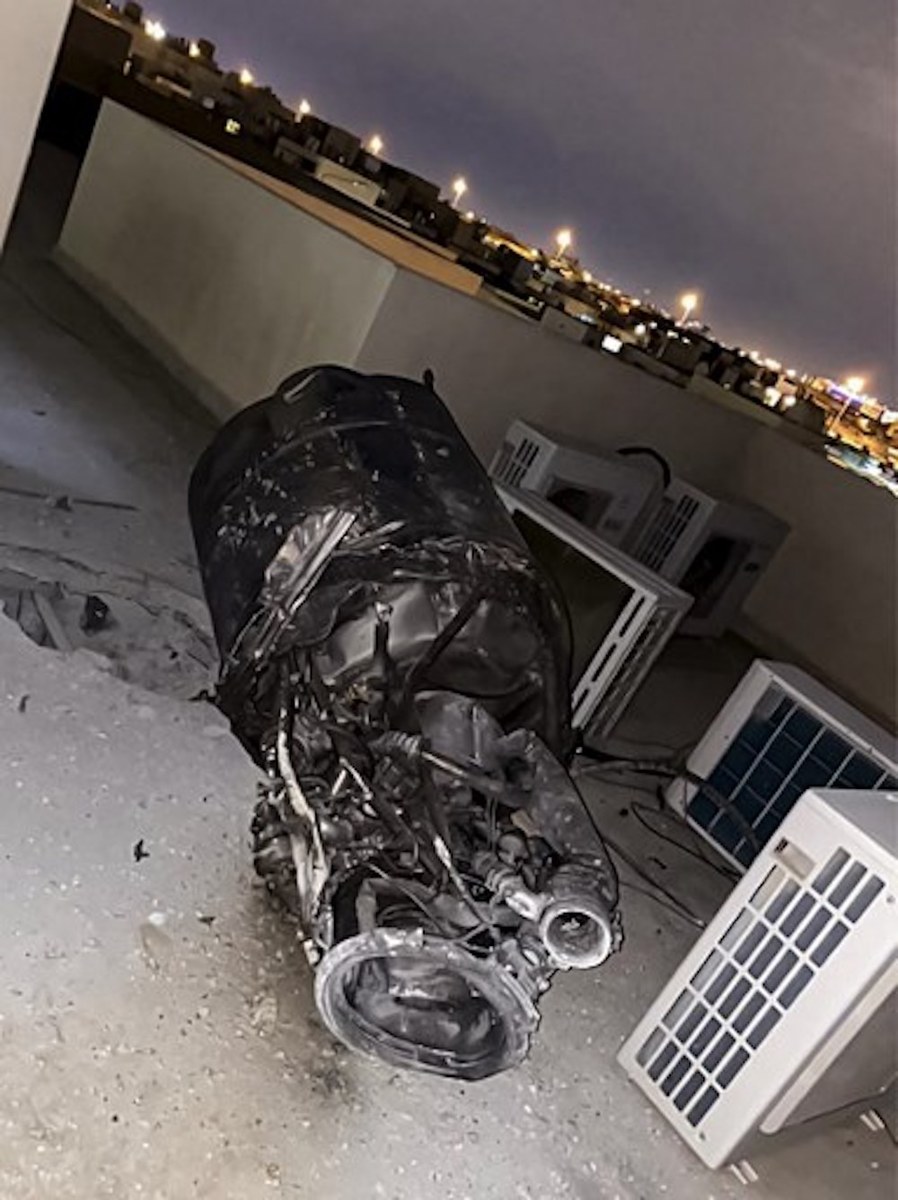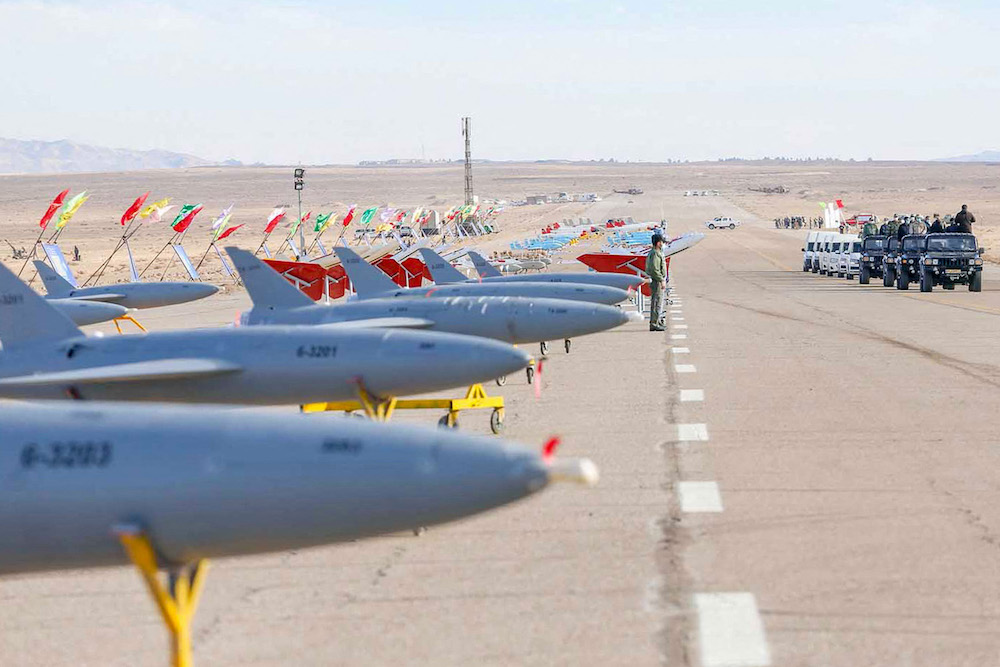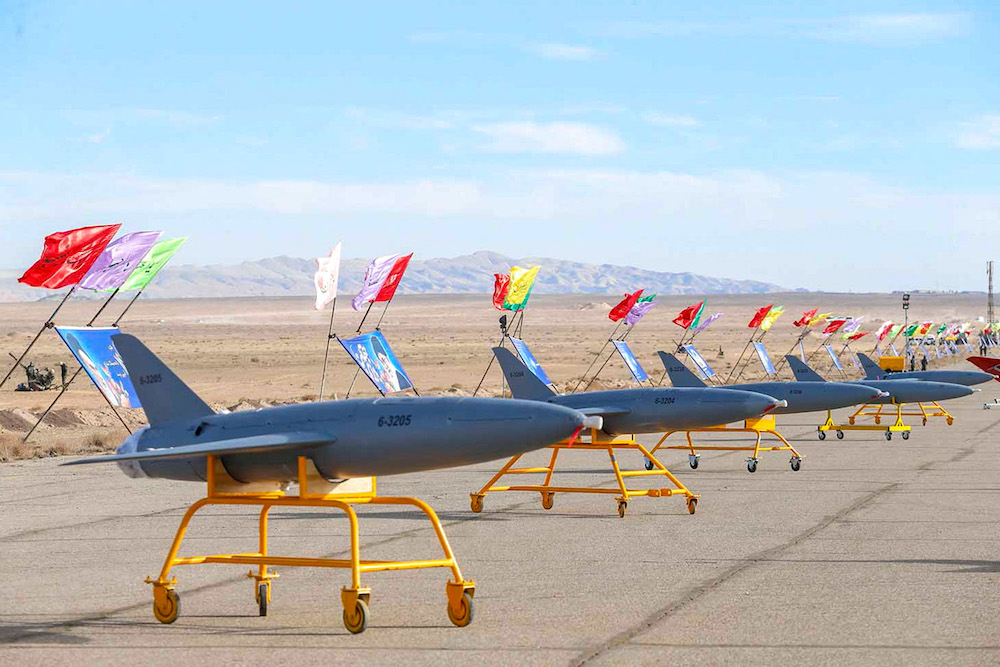WASHINGTON, D.C.: In recent months multiple waves of attacks by so-called loitering munitions, a type of unmanned aerial vehicle designed by Iran’s Islamic Revolutionary Guard Corps, have been launched against civilian facilities in various parts of the Arabian Peninsula.
Iran’s political pawn in Yemen, the Houthis, has been given the know-how and components to use the technology as part of a regional strategy that has led to a spike in drone attacks throughout the Middle East.
In one particularly devastating attack, on Sept. 14, 2019, Saudi Arabia’s Abqaiq and Khurais oil-processing facilities were badly damaged by a combined missile and drone strike, sending shock waves crashing through the global oil market.
The drones are relatively cheap to manufacture and can be difficult to defend against, particularly the loitering “suicide” munitions that have been used with increasing frequency by Iran and its proxies against Arab, American and Israeli interests across the Middle East.
The targets include civilian airports, major oil storage sites, commercial shipping, and both military and diplomatic facilities.

Defense policy planners and military commanders are hard pressed to come up with a strategy that can effectively counter Iran’s successful harnessing of asymmetric warfare to its domestic drone-production capabilities.
Ali Bakir, a research assistant professor at Qatar University’s Ibn Khaldon Center for Humanities and Social Sciences, said Tehran is leveraging drone strikes by its extremist proxies to strengthen its position in the region. A coordinated response by regional allies is needed to prevent further attacks, he added.
“Although not of sophisticated nature, Iran’s fleet of drones poses a growing threat to its neighbors and security in the Gulf,” Bakir told Arab News.
“This threat stems from the fact that Tehran is using drones with relatively primitive technology as missiles to compensate for the lack of adequate ammunition and advanced targeting systems. Equipping the IRGC’s regional franchise with these drones enables Iran to extend its reach and lethality.
“Surprisingly, despite the serious damage caused by the Iranian drones used to attack Saudi Arabia’s strategic oil facilities in 2019, no adequate and strategic response has yet been developed to counter Tehran’s drone threat, either by the Arab states or by the US.”
The IRGC’s use of proxies, such as the Houthis and Iraqi Shiite militia groups such as Kataeb Hezbollah, to launch drone strikes gives it a measure of plausible deniability. To date it has not faced any major military pushback against its expanding production line.

A missile fired by Houthi militants at Saudi Arabia in 2017 had been made in Iran. (AFP/File Photo)
This has allowed drone attacks to continue, including the strike this month on King Abdullah Airport in the southern Saudi city of Jazan that injured at least 10 civilians.
Analysts have also highlighted the ability of Iran to circumvent global sanctions to acquire the necessary components and technology to mass-produce explosives-laden UAVs.
This has allowed designated terrorist groups, trained and equipped by the IRGC’s extraterritorial Quds Force, to use increasingly sophisticated drones in locations ranging from the Golan Heights to the Strait of Hormuz.
Without a comprehensive regional strategy that employs a more active posture to deter and weaken Iran’s combat-drone capabilities, Tehran and its transnational network of militant groups is likely to conclude that the benefits outweigh the cost of escalating attacks.
“I believe that the response to Iran’s growing threat should be proactive, collective, and multi-layered,” said Bakir.

This handout image provided by Saudi Arabia's Ministry of Media on February 10, 2021 reportedly shows a view of the damaged hull of a Flyadeal Airbus A320-214 aircraft on the tarmac at Abha International Airport in Saudi Arabia's southern Asir province. (AFP/Saudi Ministry of Media/File Photo)
“In other words, countering Tehran’s drone threat should incorporate intelligence efforts to block foreign components smuggled from Germany, France, the US and other countries into Iran to be used in its drone program.
“On a military level, while it is important to develop dynamic, technological and cost-efficient solutions to address this challenge, the response should not rely solely on defensive measures. Acquiring advanced capabilities of the same nature can constitute a credible deterrence and establish a favorable balance of threat.
“The problem remains with Iran’s armed militias, which are harder to deter and have mostly little to lose. When it is necessary, drone shipments should be targeted before reaching them. Stealth attacks on Iran’s militias that use these drones should be executed to raise the cost and, whenever necessary, let Iran bear the responsibility.”
During a recent conference in Chicago, the National Council of Resistance of Iran, an organization of exiled Iranian opposition figures, attempted to highlight to a broad US audience the imperative of recognizing the growing national security threat posed by Iran’s drone program.
Alireza Jafarzadeh, deputy director of the NCRI’s Washington office, said the mastermind behind Tehran’s drone program, Brig. Gen. Saeed Aghajani, was personally responsible for orchestrating the 2019 attacks on Saudi oil facilities.
“There has to be a comprehensive policy to succeed in containing the Iranian regime’s threat regarding its drones and supporting its proxies,” Jafarzadeh told Arab News.
“The central element of the right policy should be accountability. When Tehran wages terrorism and takes people hostage and hires proxies, it uses them as a tool to gain concessions from its counterparts. So far, because of the lack of accountability, regime terrorism has actually been empowered.

A handout picture provided by the Saudi Press Agency (SPA) on February 27, 2021 shows debris on the roof of a building in Saudi Arabia's capital Riyadh in the aftermath of a missile attack claimed by Yemen's Houthi militia. (AFP/SPA/File Photo)
“Instead, there should be consequences for the regime’s illegal and rogue behavior. When former Quds Force commander Qassem Soleimani was eliminated, it made the Iranian public very happy, it created fear among the IRGC and Quds Force commanders, it demoralized its proxies, and it further shrank the influence of the regime in the region.
“Tehran threatened to take revenge but that has not come in the past 22 months. Instead, the regime lost several other key persons with no ability to retaliate. This is the best example we have that Tehran is much weaker than it claims.”
However, it appears Washington is unlikely to embark on a more proactive policy that would raise the stakes for Iran and its proxies. The Biden administration has already lifted sanctions on a number of figures linked to Iran’s ballistic missiles program, and has signaled it remains keen to restart negotiations on the Joint Comprehensive Plan of Action, also known as the Iran nuclear deal.
These moves suggest there is little appetite in the White House to tackle head-on the low-intensity drone campaign being waged across the Middle East by the IRGC.
Those, like Jafarzadeh, who strongly disagree with the US administration’s more conciliatory approach say any revived negotiations should not exclude holding Iran to account for the drone attacks.
“Tehran has to pay the price for every terror plot, every missile they fire, every UAV they launch, and every person they kill in the region or in Iran,” Jafarzadeh said.

A handout photo made available by the Iranian Army office on January 5, 2021, shows military officials inspecting drones on display prior to a military drone drill at an undisclosed location in central Iran. (AFP/Iranian Army Office/File Photo)
“For the Muslim and Arab nations, it is very important to rely on the experience of the past 40 years. The Iranian regime wants to make a show of force to obligate the countries of the region to provide concessions to the Iranian regime, but only decisiveness has worked.
“Most importantly, this regime is very weak and vulnerable and its strategic and regional resources are very limited now.”
That Tehran feels emboldened enough to launch drone strikes against oil tankers, international airports and other civilian targets, despite an array of sanctions designed to prevent them and their proxies developing such capabilities, shows that this strategy needs a rethink, according to analysts.
“We believe that sanctions will not help,” Tal Beeri, head of the research department at the Alma Research and Education Center in Israel, told Arab News.
“The Iranians know how to act militarily under sanctions, both in terms of force buildup and in terms of the use of force. The last few years have proven this well.”

A handout photo made available by the Iranian Army office on January 5, 2021, shows drones on display prior to a military drone drill at an undisclosed location in central Iran. (AFP/Iranian Army Office/File Photo)
If sanctions are proving insufficient, neutralizing the strategic threat posed by the Iranian network of proxy-enabled drone strikes will probably require a measure of cooperation and knowledge-sharing by states in the region that have found themselves in the crosshairs of Iran’s proxy militant groups.
Iran is not the only country in the region with a robust drone program. Greater regional cooperation, including better intelligence sharing and the outside acquisition of drone weapon systems, might offer an antidote to Tehran’s ambitions on a wide front.
Static air-defense systems can only hold the line up to a point against the increasingly sophisticated drone tactics and technology in the hands of the IRGC’s proxies.
“The essence of the threat is the wide deployment and accessibility of the UAVs program,” said Beeri.
“The program has become accessible to all of Iran’s proxies in the Middle East. Today all proxies have intelligence-gathering UAVs and attacking UAVs, and they know how to operate them with great professionalism.
“The UAVs program is a fact. In our opinion, it cannot be thwarted — but can be disrupted.”



























